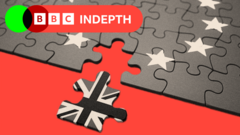As Britain prepares for its first high-level summit with the EU since Brexit, discussions center around security partnerships, trade deals, and immigration. While the Labour government promotes the potential for new opportunities, opposition voices fear a slide back into EU dependency.
Britain’s Evolving Relationship with the EU: A Summit of New Opportunities or Old Tensions?

Britain’s Evolving Relationship with the EU: A Summit of New Opportunities or Old Tensions?
The UK government is seeking to redefine its ties with the European Union through a new summit, prompting discussions about the future of cooperation post-Brexit.
On a sunny day in early November, the ornate Lancaster House in London became the backdrop for a significant meeting among European politicians discussing a renewed cooperation framework. Hosted by Foreign Secretary David Lammy, the gathering focused on pressing topics such as the ongoing war in Ukraine, security strategies for Europe, and the much-anticipated summit between the UK and EU scheduled for May 19.
Post-Brexit negotiations had halted traditional interactions between British prime ministers and EU leaders, but the recent Labour government aims to revitalize relations with Europe. This shift reflects a broader hope for improved ties articulated in election promises to foster a strong partnership with European allies.
At the summit, Labour leader Sir Keir Starmer will meet senior EU officials to lay the groundwork for a new collaborative approach. The EU ambassador to London, Pedro Serrano, heralded this development as a significant enhancement of diplomatic contacts since the last UK elections in July 2024.
While the proposal for a new security and defense partnership between the UK and EU has garnered attention, it has also stirred political debate. Criticism from Conservative figures frames the summit as a potential “surrender,” suggesting it could dilute the UK’s autonomy by tying it closer to European norms and regulations.
From the UK government’s perspective, the partnership could complement NATO, addressing issues beyond defense, including economic security and migration. Experts believe that aligning with EU defense initiatives could also stimulate the British economy, potentially granting access to substantial EU funding for defense projects.
However, the call for a veterinary deal aiming to ease border checks on food and drink post-Brexit has sparked contention. Supporters argue it could reduce costs for consumers and alleviate export hurdles but critics caution against aligning UK regulations too closely with EU standards, risking a loss of regulatory sovereignty.
Beyond defense and trade, the concept of a youth mobility deal has emerged as a topic of interest, allowing for greater cultural and workforce exchanges between the UK and EU. Despite initial hesitance from the government, this evolving notion reflects an appetite for reconnecting with European neighbors, although it raises concerns about immigration dynamics.
As one commentator noted, the relationship trajectory could hinge on how the government balances these partnerships without compromising autonomy. Thus, as leaders gather at Lancaster House, both opportunities for cooperation and reminders of the fraught history between the UK and the EU loom large in the discussions ahead.
In the realm of British politics, balancing the complex desires for independence while exploring European partnerships reveals a looming struggle between divergent perspectives—whether to pave the way for strengthened collaborations or to strictly maintain boundaries established post-Brexit.






















